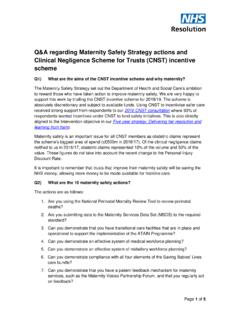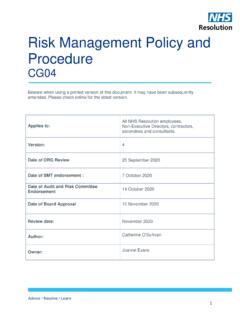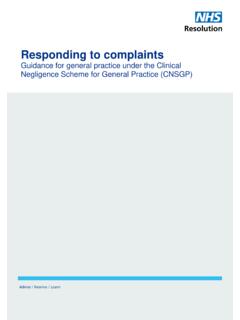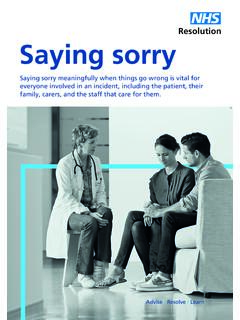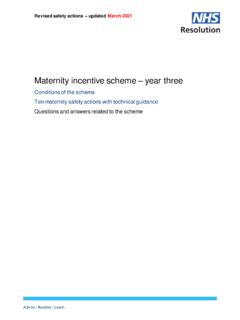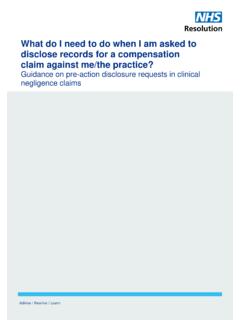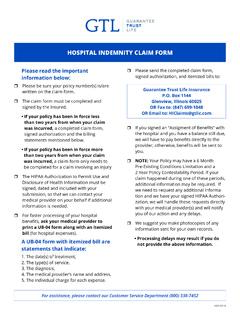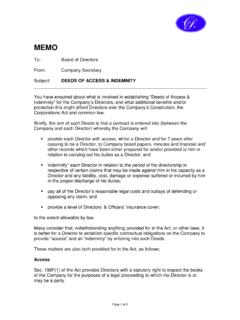Transcription of NHS Indemnity
1 NHS Indemnity Arrangements for Clinical Negligence Claims in the NHS Contents Page: NHS Indemnity .. 7 Annex A: Questions and Answers on NHS Indemnity ..11 Annex B: Indemnity for Clinical Studies Sponsored by Pharmaceutical 17 Executive summary Introduction This is a summary of the main points contained within NHS Indemnity Arrangements for clinical negligence claims in the NHS, issued under cover of HSG 96/48. The booklet includes a Q&A section covering the applicability of NHS Indemnity to common situations and an annex on sponsored trials. It covers NHS Indemnity for clinical negligence but not for any other liability such as product liability, employers liability or liability for NHS trust board members.
2 Clinical Negligence Clinical negligence is defined as a breach of duty of care by members of the health care professions employed by NHS bodies or by others consequent on decisions or judgements made by members of those professions acting in their professional capacity in the course of their employment, and which are admitted as negligent by the employer or are determined as such through the legal process . The term health care professional includes hospital doctors, dentists, nurses, midwives, health visitors, pharmacy practitioners, registered ophthalmic or dispensing opticians (working in a hospital setting), members of professions allied to medicine and dentistry, ambulance personnel, laboratory staff and relevant technicians.
3 Main Principles NHS bodies are vicariously liable for the negligent acts and Omissions of their employees and should have arrangements for meeting this liability. NHS Indemnity applies where (a) the negligent health care professional was: (i) working under a contract of employment and the negligence occurred in the course of that employment; (ii) not working under a contract of employment but was contracted to an NHS body to provide services to persons to whom that NHS body owed a duty of care. (iii) neither of the above but otherwise owed a duty of care to the persons injured. (b) persons, not employed under a contract of employment and who may or may not be a health care professional , who owe a duty of care to the persons injured.
4 These include locums; medical academic staff with honorary contracts; students; those conducting clinical trials; charitable volunteers; persons undergoing further professional education, training and examinations; students and staff working on income generation projects. Where these principles apply, NHS bodies should accept full financial liability where negligent harm has occurred, and not seek to recover their costs from the health care professional involved. Who is Not Covered NHS Indemnity does not apply to family health service practitioners working under contracts for services, eg GPs (including fundholders), general dental practitioners, family dentists, pharmacists or optometrists; other self employed health care professionals eg independent midwives; employees of FHS practices; employees of private hospitals; local education authorities; voluntary agencies.
5 Exceptions to the normal cover arrangements are set out in the main document. Circumstances Covered NHS Indemnity covers negligent harm caused to patients or healthy volunteers in the following circumstances: whenever they are receiving an established treatment, whether or not in accordance with an agreed guideline or protocol; whenever they are receiving a novel or unusual treatment which, in the judgement of the health care professional , is appropriate for that particular patient; whenever they are subjects as patients or healthy volunteers of clinical research aimed at benefitting patients now or in the future.
6 Expenses Met Where negligence is alleged, NHS bodies are responsible for meeting: the legal and administrative costs of defending the claim or, if appropriate, of reaching a settlement; the plaintiffs costs, as agreed by the two parties or as awarded by the court; the damages awarded either as a one-off payment or as a structured settlement. NHS Indemnity NHS Indemnity Clinical Negligence - Definition 1. Clinical negligence is defined as: A breach of duty of care by members of the health care professions employed by NHS bodies or by others consequent on decisions or judgements made by members of those professions acting in their professional capacity in the course of employment, and which are admitted as negligent by the employer or are determined as such through the legal process.
7 2. In this definition breach of duty of care has its legal meaning. NHS bodies will need to take legal advice in individual cases, but the general position will be that the following must all apply before liability for negligence exists: There must have been a duty of care owed to the person treated by the relevant professional (s); The standard of care appropriate to such duty must not have been attained and therefore the duty breached, whether by action or inaction, advice given or failure to advise; Such a breach must be demonstrated to have caused the injury and therefore the resulting loss complained about by the patient.
8 Any loss sustained as a result of the injury and complained about by the person treated must be of a kind that the courts recognize and for which they allow compensation; and The injury and resulting loss complained about by the person treated must have been reasonably foreseeable as a possible consequence of the breach. 3 This booklet is concerned with NHS Indemnity for clinical negligence and does not cover Indemnity for any other liability such as product liability, employers liability or liability for NHS trust board members. _____ * The NHS (Clinical Negligence Scheme) Regulations 1996, which established the Clinical Negligence Scheme for Trusts, defines clinical negligence in terms of.
9 A liability in tort owed by a member to a third party in respect of or consequent upon personal injury or loss arising out of or in connection with any breach of a duty of care owed by that body to any person in connection with the diagnosis of any illness, or the care or treatment of any patient, in consequence of any act or omission to act on the part of a person employed or engaged by a member in connection with any relevant function of that member . Other Terms NHS Indemnity 4. Throughout this guidance: The terms an NHS body and NHS bodies include Health Authorities, Special Health Authorities and NHS Trusts but excludes all GP practices whether fundholding or not, general dental practices, pharmacies and opticians practices The term health care professional includes.
10 Doctors, dentists, nurses, midwives, health visitors, hospital pharmacy practitioners, registered ophthalmic or registered dispensing opticians working in a hospital setting, members of professions supplementary to medicine and dentistry, ambulance personnel, laboratory staff and relevant technicians. Principles 5. NHS bodies are legally liable for the negligent acts and omissions of their employees (the principle of vicarious liability), and should have arrangements for meeting this liability. NHS Indemnity applies where: the negligent health care professional was working under a contract of employment (as opposed to a contract for services) and the negligence occurred in the course of that employment; or the negligent health care professional , although not working under a contract of employment, was contracted to an NHS body to provide services to persons to whom that NHS body owed a duty of care.
